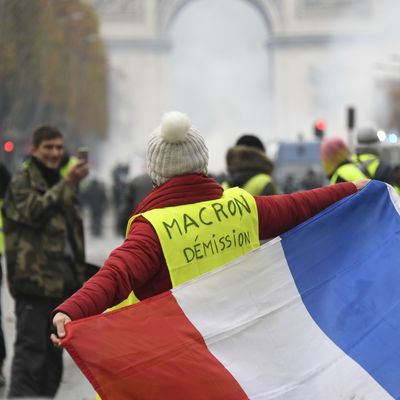
Emmanuel Macron’s centrist policies may have made him popular with an international audience, but in his own country, they prove less popular by the day. The New York Times reported that three people were killed and at least 260 were wounded nationwide in street protests associated with the country’s burgeoning “yellow vest” movement. The demonstrations, which have unfolded in fits and starts since November, were ostensibly spurred by Macron’s new fuel tax. Branded as a green policy, Reuters described the tax as an attempt to “urge motorists to change behavior and protect the environment.” Macron had previously promised to reduce France’s carbon output by 40 percent by 2023. Protesters, meanwhile, describe their actions as a demonstration against inequality. “We just don’t make it to the end of the month,” Elodie Marton, a protester from the economically depressed town of Guéret told Times. Another Guéret protester, Olivier Depourtoux, criticized the government’s response to the situation. “The citizens have asked for lower taxes, and they’re saying, ‘Ecology,’” he complained.
But the protests aren’t just a backlash against higher taxes. Nor do they appear to be motivated by some political commitment to the use of fossil fuels; in other words, communities are not rallying against the French version of a “war on coal.” “We’re not anti-environmental,” one of the movement’s organizer’s said in a viral video, as reported in Jacobin. “This is a movement against abusive taxation, period.” As Jacobin notes, diesel costs have risen by 23 percent over the last year. Macron’s fuel taxes stacked a new expense on top of that extant trend by raising diesel prices an additional 7.6 cents per liter.
Taxes help sustain welfare states, and the consumption of fossil fuels undeniably contributes to climate change — a trend that, unless reversed, will itself become a major drive of inequality. But the yellow vests occupy Paris streets in an age of austerity. According to Reuters, Macron’s government has only earmarked 7.2 billion of the estimated 34 billion euros the fuel tax will raise for “environmental measures.” There is a discrepancy between Macron’s progressive goals as stated, and the impact of his actual policy — and that problem is not unique to the fuel tax. France’s yellow vests may catapult Macron’s presidency into a new crisis, but this is not the first time the French have taken to the streets in protest of Macron’s pro-business policies.
Macron — hailed by some at the time of his election as a sensible moderate alternative to the further-left Jean Luc Melenchon and as a necessary obstacle to the French far-right’s quest for greater power — has consistently pursued a reformist agenda marked by cuts to social spending. In May, thousands of high-school students joined unionists and civil servants to protest Macron’s plan to cut 120,000 civil service jobs in addition to a reduction in benefits for France’s railway workers, who are unionized, public-sector employees. Macron’s 2019 budget “includes an €18.8 billion reduction in payroll and other business taxes to encourage hiring and investment,” the Times reported in October. That’s a continuation of tax policies he premiered not long after taking office in 2017; a newly empowered Macron moved swiftly to cut taxes for corporations and for the wealthiest 10 percent of French households. The unrest that manifests itself in the yellow vest movement has built up over time, as a reaction against a president perceived to be favorable to corporations at the expense of the beleaguered French working class. Other controversies have only encouraged that perception. Alexandre Benalla, a former high-ranking security aide to Macron, now faces a Senate inquiry into his off-duty beating of a May Day protester. Macron fired Benalla a full six weeks after initial reports of the aide’s violence, a delay that sparked outrage at the time.
Amidst these failures, Macron’s public favorability has plummeted. A September Ifop poll found that 29 percent of respondents surveyed approved of Macron’s performance as president. According to another Ifop poll released in November, 30 percent of French voters support the nation’s furthest-right parties for upcoming elections to the the European Parliament; Macron’s centrist En Marche party and Melenchon’s French Insoumise both lag well behind that total.
Macron’s response does not suggest he understands the implications of the yellow vest movement, either as they pertain to his party’s political chances or as they affect the centrist ideology he’s promoted as president. On Monday, France24 reported that Macron’s prime minister, Édouard Philippe, will meet with yellow vest representatives, though the government itself seems committed to seeing its policies through. “We have said that we won’t change course. Because the course is good,” said Macron spokesman Benjamin Griveaux.






























